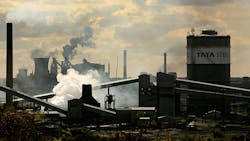LONDON — India’s Tata Steel completed the part-sale of its European assets on Wednesday, safeguarding 4,800 jobs, though thousands more remain threatened with no buyer found for the rest of the business.
Tata Steel UK announced completion of the sale of its European piping business to Greybull Capital, a British-based family investment firm for an undisclosed sum. The deal, hailed by Tata, the British government and unions, means the return of the British Steel brand for the first time since 1999.
“From today, the Long Products Europe business ... will trade under the name of British Steel,” Tata Steel UK said in a statement. “All together, the business employs 4,800 people — 4,400 in the UK and 400 in France. The sale follows an accelerated process of negotiations between Tata Steel UK and Greybull Capital.”
Britain’s government has been racing to find a buyer for Tata’s U.K. assets — and save around 16,000 jobs — after the company’s shock announcement in March that it was selling because of a global oversupply of steel, cheap imports into Europe, high costs and currency volatility.
In April, Tata Steel said it had agreed to sell its Long Products Europe (LPE) division, whose chief asset is the Scunthorpe works in northern England, to Greybull Capital. Tata is still looking for a buyer for the rest of its British assets, including the Port Talbot steelworks on the south Wales coast, Britain’s biggest steel plant, which employs 4,000 workers.
“The sales process for the wider UK business is continuing,” Tata told AFP in an emailed statement Wednesday. “Although we have been clear that the process needs to be time bound — to avoid uncertainty for employees and customers — we have not set a deadline on when it needs to conclude.”
Last month, Tata Steel said it had selected seven bidders as potential buyers of its remaining loss-making U.K. activities.
Prime Minister David Cameron’s Conservative government has meanwhile said it would contribute hundreds of millions of pounds to any potential deal and take a 25% stake in the assets.
Tata said it would “not be commenting on the agreed price with Greybull.” It had been widely reported that LPE was sold for a nominal £1 ($1.44), while Greybull said it would arrange a £400 million ($576.90 million) investment and financing package as part of the deal.
The U.K. assets formerly belonged to Anglo-Dutch steelmaker Corus, which Tata bought for $13 billion in 2007 — at the height of Chinese steel demand and before the global financial crisis. Corus had been formed through the merger of British Steel and Koninklijke Hoogovens in 1999.
“The name British Steel has a long and proud history and... (the Greybull deal) underlines the government’s belief that there really is a viable, sustainable future for world-class steelmaking in this country,” Britain’s business secretary Sajid Javid said in a statement.
Len McCluskey, general secretary of Britain’s biggest union Unite, said the “first day of trading for British Steel is testament to the skills of the workforce and their union representatives who have worked hard to secure the future of Tata Steel’s former long products division.”
From a rich beginning, Britain’s steel industry has dwindled after losing foreign and domestic share to cheaper rivals. It accounted for 40% of the world’s steel production in 1875 thanks to huge factory output in England’s northern city Sheffield. Since the mid-20th century, Britain’s steel industry has been nationalized and privatized on various occasions.
Copyright Agence France-Presse, 2016
About the Author
Agence France-Presse
Copyright Agence France-Presse, 2002-2025. AFP text, photos, graphics and logos shall not be reproduced, published, broadcast, rewritten for broadcast or publication or redistributed directly or indirectly in any medium. AFP shall not be held liable for any delays, inaccuracies, errors or omissions in any AFP content, or for any actions taken in consequence.
